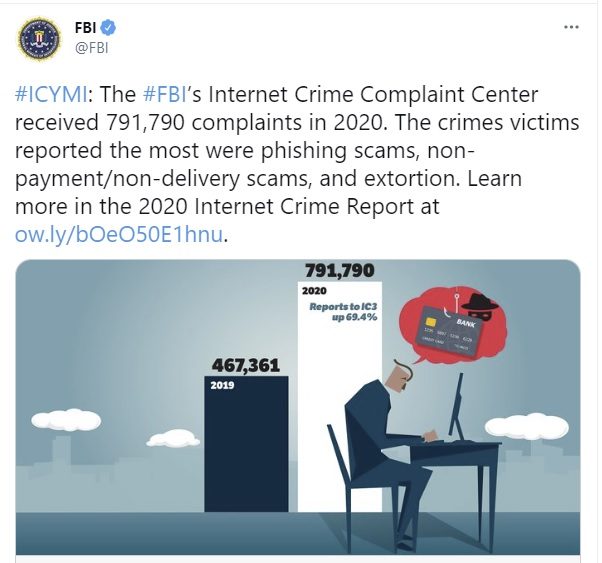Email phishing scams at Chapman mirror latest trend seen in March 2021 FBI internet crime report.
April 14, 2021
During the month of March 2021, FBI released its Internet Crime Complaint Center (IC3) Crime Report.
The report contains information from 791,790 complaints of suspected internet crime and reported losses exceeding $4.2 billion (yes, with a B).
The top three crimes reported using the IC3 platform were:
- phishing scams
- non-payment/non-delivery scams
- extortion
Covid-19 scams also made the list with 28,500 complaints related to the pandemic during 2020..
“In addition to statistics, the IC3’s 2020 Internet Crime Report contains information about the most prevalent internet scams affecting the public and offers guidance for prevention and protection. It also highlights the FBI’s work combating internet crime, including recent case examples. Finally, the 2020 Internet Crime Report explains the IC3, its mission, and functions.”
Chapman’s Online Training and Awareness Program consists of video modules and simulated phishing emails. The goal of this program is to help our users better protect both Chapman University’s sensitive information and their own.
Phish-Train approach. Here is an outline of how a Phish-Train cycle works:
First a simulated phishing email is sent to Staff and Faculty. The users who click on the link will be enrolled in an online training and will immediately receive an email notification.
The program follows Information Security Industry best practices and has been created by the offices of Human Resources and Information Security.
A Steering Committee comprised of key members from the following departments: Internal Audit, Financial Services, Human Resources, Information Systems and Technology and Chapman University’s Office of the Provost manage and monitor this program.
Starting the month of April, the users who entered data in a simulated phishing email will have their passwords reset by the Department of Information Systems and Technology.
This is a preventive measure for the eventuality that the same account that was entered in a simulated phish email was also entered in a real phish email.
We cannot emphasize enough the importance of being able to tell a legitimate email from a phishing email. If you do fall for a phishing email, real or simulated, please change your password immediately and notify the department of information security at abuse@chapman.edu
Useful resources have been made available by the department of Information Security at the following locations:
www.chapman.edu/scams – trending scams
www.chapman.edu/phishing – Information on how to identify Phish Emails
www.chapman.edu/aup – our Computer and Network Acceptable Use Policy
www.chapman.edu/security – The latest reported phishing emails
abuse@chapman.edu – Information Security’s email for all things Phish Emails. Email us for any questions or reports of Phish Emails in your Inbox.
We encourage you to carefully read the first three pages listed above.


